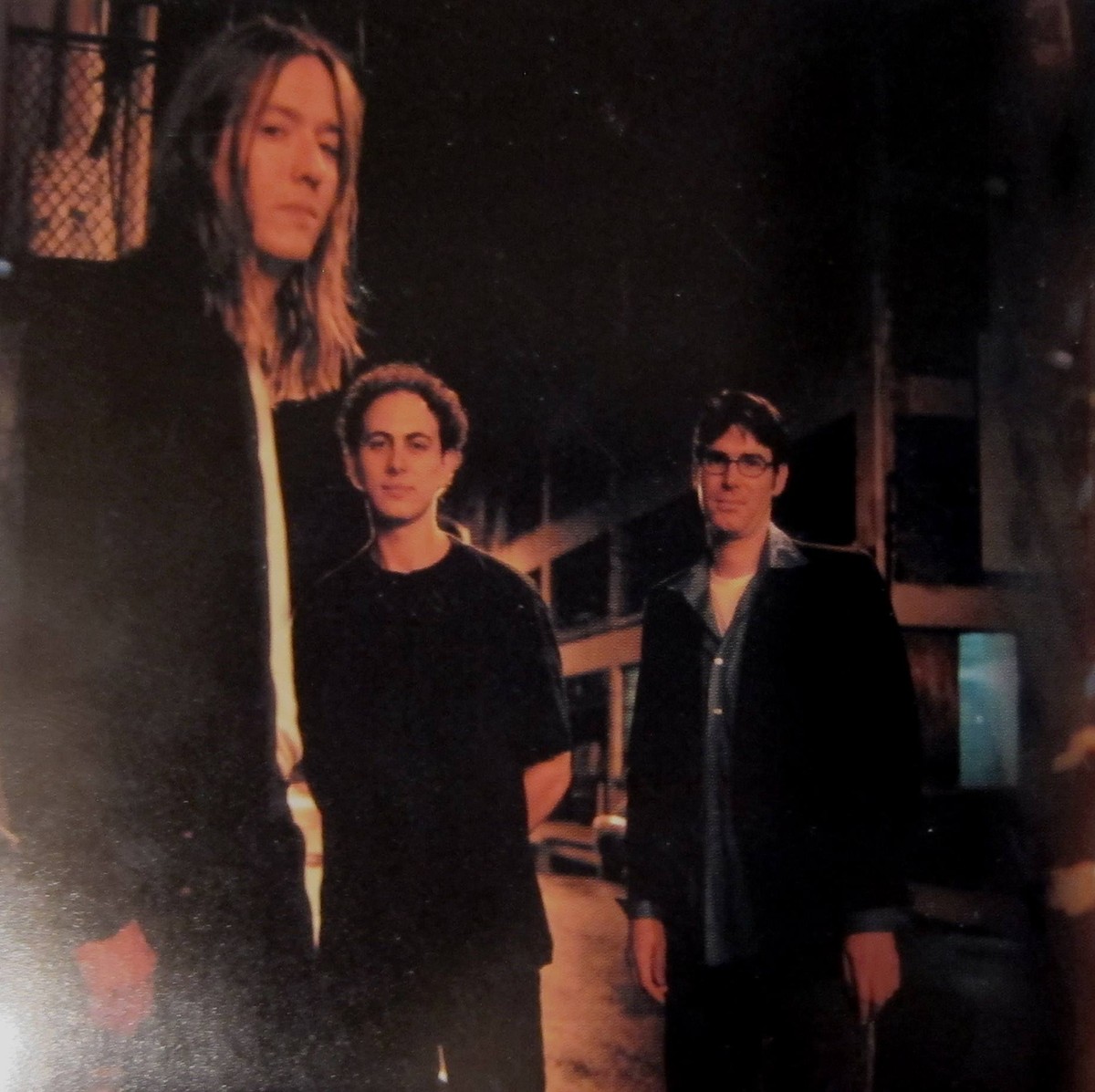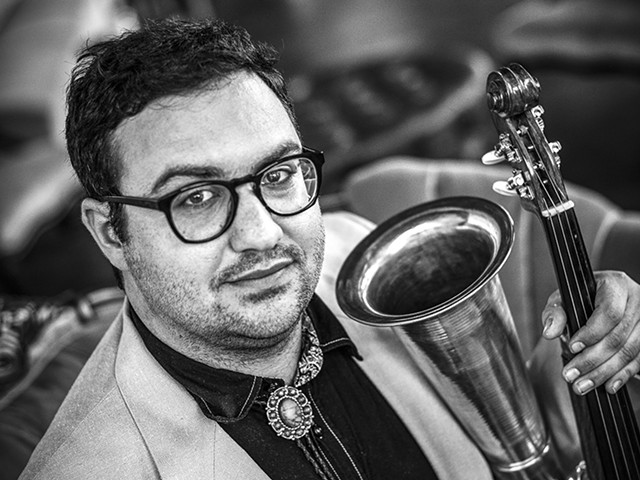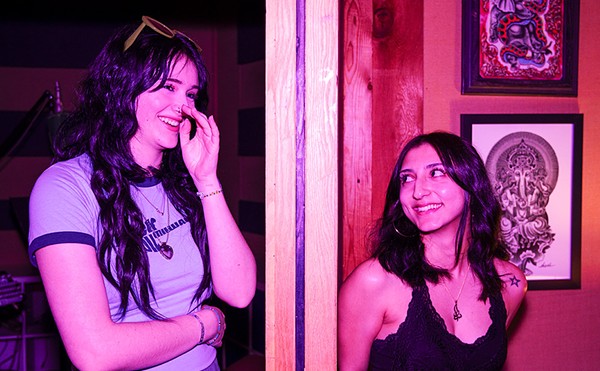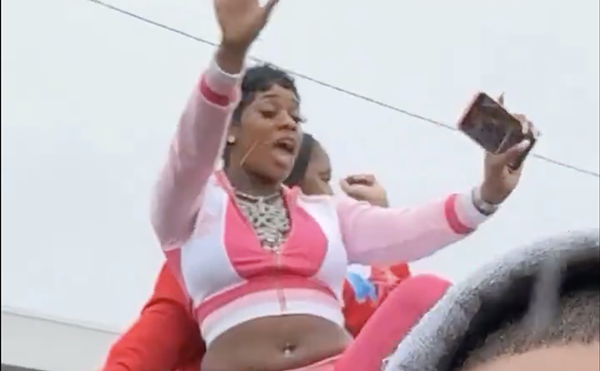Twenty years ago, Nadine played the Sheldon, in support of a new album called Downtown, Saturday.
As life and events would unfold, the band would achieve a degree of success with that album. They'd sign to a European label ("Glitterhouse, the SubPop of Germany") and help anchor the Undertow music collective in their hometown. They'd gain and lose members, record more music and, as is the trajectory of many a group, cease operations.
Once again, Nadine is set to play the Sheldon, in support of a now-seasoned album called Downtown, Saturday. It'll happen on Tuesday, October 22, and will feature a no-frills evening in which the core members of the band get together, play a single release and, in the words of songwriter and vocalist Adam Reichmann, "I hope that people will find that satisfying in and of itself."
Reichmann says that he and key bandmates Todd Schnitzer and Steve Rauner had kept in touch over the years, even playing a one-off gig in front of friends not so long ago. But the idea of a fully realized, rehearsed, produced and promoted show didn't come together until earlier this year. As the band kicked around the idea, "we could have let it drop and said, 'Those were the good old days.' But it came together nicely."
While the band collectively wrote other material, Reichmann feels that giving this particular album a featured evening is the right call. On many a level.
"I think we were, musically, really excited to be where we were," Reichmann says. "And we had a lot of music that we were excited about at the time — Beck's Mutations, Wilco's Summerteeth. There were a lot of things happening in the songwriter/Americana scene, and we were excited to have a part to play in that. Plus, that's when the European press came and drew us over to play there. To feel like someone really wanted to hear what we were playing was great. Like a lot of St. Louis bands, we didn't know if we'd be able to get out of town, or if anyone cared. Legitimately, that first time of feeling that it's worthwhile was really exciting for us.
"I think all of the stuff that we recorded for that record still has a huge place not just in my heart, but in Todd's and Steve's as well," Reichmann says. "That's when everything came together for us. I still have memories connected to that time. It's an interesting space, emotional time travel. It's not like reading your own diaries, but you're performing your old diaries in front of people. Having to inhabit the same body and to sing these songs has been pretty intense. All the music still feels relevant to me. There's some righteous anger there that's mellowed in time. It's a pretty literary album, and a lot of the descriptions resonate with me. There're certainly other songs that we'd written that I don't feel as strongly about. But it's a special record, and that's why when Steve came in for his birthday this year, it was this one we were reminiscing about."
As Reichmann begins spinning tales about that time period in St. Louis' rock & roll community, he drops the names of some familiar places and people and recalls a few quirks of that moment. At the time, for example, the 3600-3800 blocks of Utah, now featuring some of the most desirable real estate in St. Louis city, were populated by more than a couple "band houses," and that's where the members of Nadine shared a home, Monkees-style. After rehearsals, they'd decamp to the nearby Way Out Club, then at Compton and Cherokee, where they'd catch bands like the Highway Matrons, another band that called Utah home.
Nadine recorded Downtown, Saturday, yes, downtown. There, inside the big, foreboding A.D. Brown warehouse at Washington Avenue and Tucker Boulevard, they'd string power lines from one floor to the next, in a guerrilla studio that made them feel all alone in the world, even as they were on the edge of the commercial district a couple years away from a complete reboot. It was a heady time to be a musician in St. Louis, and Reichmann feels, with a songwriter's flourish, that "it was a tighter scene and bit dark. I think it was sort of a dark time. Or maybe I'm always thinking that life's a little bit dark."
Musically, that time brought Nadine some challenges (see above: rogue power cords, empty warehouse) but also some freeing elements. Reichmann notes that in the pre-cell-phone age, he received a phone call from Schnitzer. The latter was "becoming interested in the intersection of rock with hip-hop and electronica" and had begun toying with drum loops. Over the phone, he'd play Reichmann the sneaky-cool percussive base that became the foundation of their album-opening cut "Closer."
While Wilco's then-drummer Ken Coomer was a contributor to Downtown, Saturday, Reichmann says that "we were having fun recording. Moments like [Todd's call], or working with Ken and really getting into the idea of multi-tracking ... we didn't have to always play live. Our music could be as big as our imagination. It was pretty liberating, a special time. Kids today can get a pretty nice-sounding studio together for cheap. At the time, we didn't have that control. We had ADATs and other things that we'd buy at Guitar Center and then return. We scraped things together like that to make it work, right at the birth of self-recording."
For their Downtown, Saturday show at the Sheldon, the band is bringing in a friend, the well-regarded record producer Matt Pence, who'll be featured on percussion. While he initially questions whether he should mention it, Reichmann does note that the band will record the show; after all, they'd developed a cult following not only in the States but in Germany, and plenty of folks won't be able to catch the Grand Center show live. Plus, "we're no longer a commercial entity," Reichmann says, and the ease of digital sharing might allow the night to live beyond Tuesday's gig.
"Twenty's a big number," Reichmann says. "Not to be too grim about it, but it's important to celebrate things along the way. You only live once, and for us to have another special night is more important for me now than ever. This'll only happen so many more times. In twenty more years, who knows? More people pass on, bigger life events happen. If anything, this show reminds me how special things are, and I know I've used 'special' 14,000 times, which devalues the word, but you want to not take things for granted."






